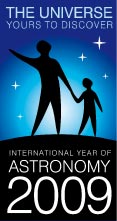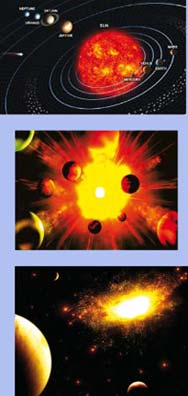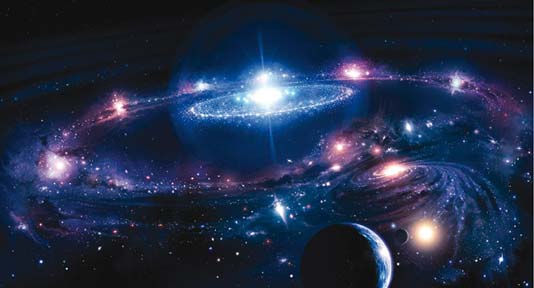|
The Universe:
Yours
to Discover
  Who does not like the sheer wonder of a
starry night? But apart from the moon, how many of us can name even a
planet in the night sky, leave alone a star, even one as bright as
Sirius? Astronomy, basically the study of stars and planets, is a
fascinating subject. Who does not like the sheer wonder of a
starry night? But apart from the moon, how many of us can name even a
planet in the night sky, leave alone a star, even one as bright as
Sirius? Astronomy, basically the study of stars and planets, is a
fascinating subject.
Unfortunately, only a very few are interested in this subject in Sri
Lanka and many other countries. Yet, one does not need a very costly
computer-controlled telescope (fine, if you can afford one) to gaze at
the stars - a low-end telescope or even a set of binoculars will do.
That is the first step in discovering the Universe we live in. This
is exactly what Galileo did exactly 400 years ago.
This is where the International Year of Astronomy (IYA2009) comes in.
As you guessed, this is the Year of Astronomy. It will be a year long
celebration of astronomy, to coincide with the 400th anniversary of the
first recorded astronomical observations with a telescope by Galileo
Galilei and the publication of Johannes Kepler’s Astronomia nova in the
17th century.
Of course, astronomy has reached starry heights since Galileo, with
space telescopes, radio telescopes and unmanned space missions. Yet, the
fundamental principle remains the same - there are still so many things
we do not know, including, whether life exists elsewhere in the
universe.
The Year was declared by the 62nd General Assembly of the UN. A
global scheme, laid out by the International Astronomical Union (IAU),
has also been endorsed by UNESCO - the UN body responsible for
educational, scientific and cultural matters. The opening ceremony was
held in Paris on Jan. 15-16. More than 140 countries are participating
in IYA2009 activities.
The aim of the Year is to stimulate worldwide interest, especially
among the young, in astronomy and science under the central theme “The
Universe, Yours to Discover”.
IYA2009 events and activities will promote a greater appreciation of
the inspirational aspects of astronomy that embody an invaluable shared
resource for all nations.
 It will help the citizens of the world rediscover their place in the
Universe through the day and night sky, and engage in a personal sense
of wonder and discovery. It will help the citizens of the world rediscover their place in the
Universe through the day and night sky, and engage in a personal sense
of wonder and discovery.
IYA2009 activities are taking place at global and regional levels,
and especially at the national and local levels. National Nodes in each
country, including Sri Lanka, are running activities throughout the
year, aimed at establishing collaborations between professional and
amateur astronomers, science centres, educators, and science
communicators.
“Everyone should realise the impact of astronomy and other
fundamental sciences on our daily lives, and understand how scientific
knowledge can contribute to a more equitable and peaceful society,” says
an IYA spokesman.
IYA2009 will promote and facilitate the creation of international
networks to foster a global appreciation of the role and value of
science and astronomy as a unifying activity for humanity.
IYA2009 will start up, connect and support networks of professional
and amateur astronomers, educators and astrophysicists from all over the
world, so that all these valuable sources of knowledge can be shared.
The networks of hundreds, if not thousands of astronomical
organisations, nationally and internationally, will be one of the
legacies of IYA2009 that will last far beyond the year 2009.
(Watch this space for more updates on IYA and space exploration)
|


